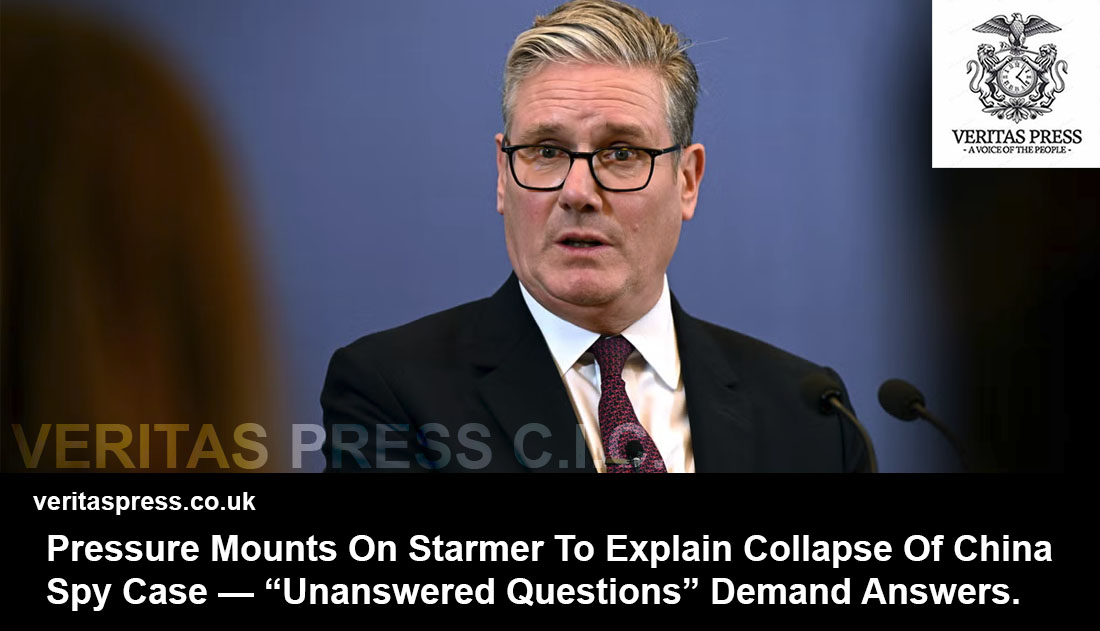Sir Keir Starmer finds himself under intense scrutiny as opposition figures and former security officials press him to address “unanswered questions” about the controversial collapse of a high-profile espionage prosecution. At the heart of the storm is the case against two men accused of spying for Beijing, and whether the government obstructed justice by withholding evidence or failing to designate China a security threat at the relevant time.
What We Know So Far:
- In September 2025, prosecutors unexpectedly dropped charges against Christopher Cash, a former parliamentary researcher, and Christopher Berry, a teacher. The allegations had centred on the claim that they collected and passed politically sensitive information to agents of the Chinese state between December 2021 and February 2023.
- The Director of Public Prosecutions (DPP), Stephen Parkinson, publicly stated that the case could not proceed because the government had not provided evidence that China had been formally designated a national security threat during that period, a legal requirement under the Official Secrets Act 1911.
- Prosecutors, the DPP said, had sought this evidence “over many months,” but it had not been forthcoming from the government.
That outcome has triggered a political firestorm, with cries of a cover-up emanating from the Conservative opposition, former security ministers, and intelligence figures.
Badenoch’s Letter: Demanding Transparency.
On the morning Parliament resumed from its conference recess, Kemi Badenoch, now leader of the Conservative Party, intensified pressure on the Prime Minister. She penned a public letter demanding “clarity and honesty,” and called for a full statement in the House of Commons explaining:
- Why the government’s account has shifted repeatedly
- Whether Sir Keir or any senior minister intervened in interactions with the CPS before the charges were dropped
- What role, if any, did Jonathan Powell, the national security adviser, play in evidence decisions
- Whether the government still maintains that it would have been impossible to argue in court that China was a threat
- Who knew what, when, and why — i.e. a full timeline of decision-making
- Whether any economic or diplomatic fears (e.g. China withdrawing investment) factored into the decision
She warned that if Starmer would not deliver the statement himself, he should at least instruct a senior minister to do so. “The public and Parliament deserve answers and transparency,” she wrote.
Badenoch’s intervention was quickly echoed by former security minister Tom Tugendhat, who called the collapse “absolutely abhorrent,” and accused the government of being “willing to cover up the actions of a hostile state.” He framed the controversy as a direct assault on democratic accountability:
“The principal charge is that in the interests of a foreign power, the government seemingly has intervened either by action or omission in the proceedings of justice in this country.”
Government Response: Denials, Deflections, And Tight Lines:
The government has responded forcefully, rejecting suggestions of interference or pressure:
- No 10 insists claims that it concealed evidence, withdrew witnesses, or influenced the CPS are “categorically untrue.”
- The Downing Street spokesperson asserted that no minister, no special adviser, made any decisions relating to the case, that it was strictly a CPS matter.
- The government claims it provided the CPS with evidence consistent with the previous administration’s position on China, but only relating to the threat assessments at the relevant time.
- On the question of Jonathan Powell’s involvement, ministers have repeatedly denied that he had influence over the substance or evidence of the case.
- Bridget Phillipson, Education Secretary, gave the clearest assurance yet: “Yes, I can give that assurance” that Powell played no role.
- Foreign Office minister Hamish Falconer acknowledged that China does pose national security threats, in cyberspace, transnational repression, and its Russian ties, but defended the government’s reticence to prosecute under the constraints of the Official Secrets Act. He called the Act “ropey” and “archaic.”
- Ministers also denied suggestions that concerns about Chinese investment pulling out influenced the decision. “Entirely false,” said the PM’s spokesman.
Nonetheless, cracks in the government narrative are emerging.
Voices from the Security Community: Confusion, Criticism, Concern
The collapse has also drawn strong reactions from senior figures across the intelligence and civil service establishment:
- Sir John Sawers, former MI6 chief, said he was “a bit confused and unsure” why the case was dropped, suggesting U.S. allies will be “perplexed.”
- Lord Mark Sedwill, former National Security Adviser, publicly declared that China does pose a threat and questioned why critical intelligence dossiers were not passed to prosecutors.
- Lord Simon Case, former Cabinet Secretary, among others, has flagged that intelligence services had long warned of Chinese espionage and technology threats, raising the question of why these were not acted upon.
- A report in The Times alleged that a Home Office-compiled dossier on Chinese threat activity (cyberattacks, espionage, surveillance) was never handed to prosecutors after Labour entered office, a potentially pivotal omission.
These voices lend weight to the argument that the collapse reflects deeper institutional dysfunction or political caution rather than purely legal technicalities.
The Broader Context: Labour’s Softening China Posture & The Embassy Row.
Many analysts see the spy case controversy as part of a broader recalibration in Labour’s China policy:
- Since coming to power, the Starmer government has signalled a more conciliatory, engagement-oriented approach. Some observers argue that this “softening stance” has now been reinforced by the spying case collapse.
- Labour earlier pledged a public audit of UK–China relations, but this has been folded into the National Security Strategy (published in June), which describes China as a “geostrategic challenge,” not an “enemy.” A reluctance that critics say undermines the espionage case.
- Meanwhile, China has applied to build a “super embassy” complex at Royal Mint Court. The Times reports that the government has already given assurances to Beijing about progressing the planning application. The planning decision is expected by 21 October 2025.
- Tensions are rising within Labour: some cabinet ministers reportedly want to block the embassy application outright on national security grounds.
The juxtaposition is stark: while the government publicly claims to consider China a security threat in certain domains, its handling of the spy case and its handling of the embassy application raise doubts about how robustly it is willing to act.
What Starmer Faces This Week in Parliament:
With MPs back in Westminster, the storm is expected to intensify:
- The Conservative Party is pushing for an urgent question, demanding ministers be summoned to explain the collapse.
- Senior Tory figures, including Sir Iain Duncan Smith, have applied for an emergency parliamentary debate.
- Badenoch’s six-pointed questions will likely frame much of the scrutiny.
- Security Minister Dan Jarvis is expected to provide an update to the Commons this afternoon.
- Downing Street has already denied any role in pressuring the CPS or manipulating evidence.
- Starmer himself, presently in Egypt attending a Gaza summit, has so far declined to make a statement.
If he does address the matter in Parliament, he may be forced to confront the biggest challenge to his government’s national security credibility since taking office.
Possible Scenarios and Risks:
As the row unfolds, several possible outcomes and pitfalls loom:
- Full disclosure and inquiry
Starmer could accede to calls for a transparent account, perhaps via a parliamentary statement or independent review. This might defuse accusations of a cover-up, but it also risks exposing internal divisions or mistakes. - Stonewalling and deflection
The government may continue to deny any wrongdoing, insisting the decision was purely legal. But sustained pressure and leaks from former officials could gradually erode public trust. - Targeted resignations
Should evidence (for example, from documents or whistleblowers) emerge implicating Powell or senior officials, resignations might become unavoidable, putting Starmer in the political firing line. - Diplomatic backlash
The U.S. and other allies, already uneasy about China’s expanding influence, may perceive the collapse as weakening the UK’s credibility in counterespionage and intelligence cooperation. The former MI6 chief’s comment that U.S. allies may be “perplexed” underscores that risk. - Policy shift on China & security law reform
The fallout may induce the government to strengthen espionage laws, review the Official Secrets Act, and be more cautious about its diplomatic posture toward Beijing.
Key Questions Still Unanswered:
- Why was crucial evidence on China’s threat activity (including a reportedly withheld MI5/Home Office dossier) not shared with prosecutors?
- Did Powell (or anyone in Number 10 or the Cabinet Office) ever counsel against designating China a security threat, to protect diplomatic or economic interests?
- Was the decision to drop the case influenced by fears of Beijing retaliating through investment withdrawal or trade consequences?
- Who within the government decided what material could or could not be disclosed to the CPS, and why those decisions were made?
- Did Starmer himself ever see or approve the decisions, or was he insulated from detailed handling?
- Will the government revise its public stance and strategy toward China, or maintain the current balance of engagement and caution?
Conclusion:
The collapse of the China spy case has become more than a legal footnote; it is now a test of the Starmer government’s credibility on national security, transparency and its China strategy. As pressure builds to answer to Parliament and the public, the coming days may prove pivotal for how the UK navigates the balance between asserting sovereignty and engaging with one of its most complex strategic rivals.
Advertisements
Tags:




























